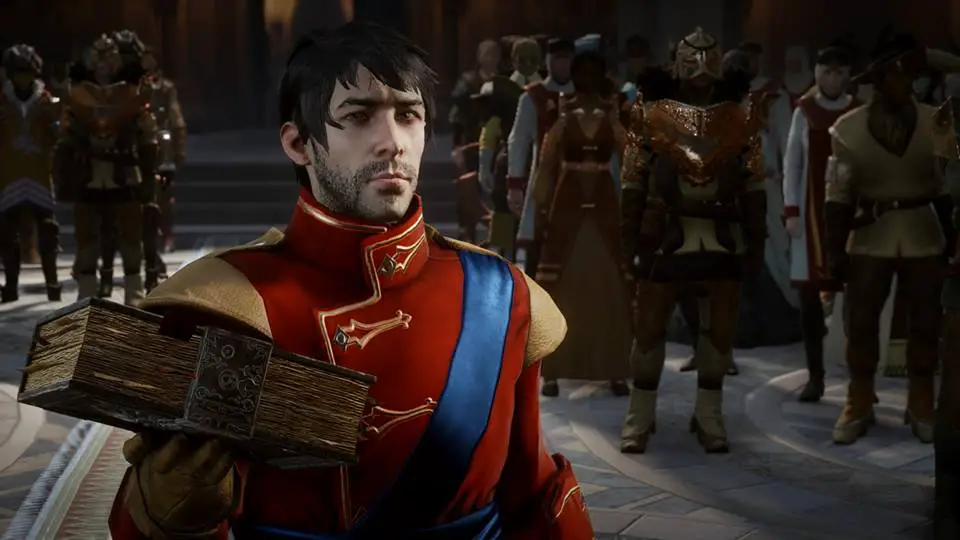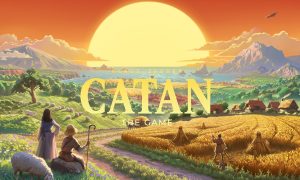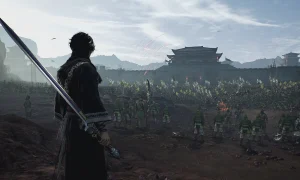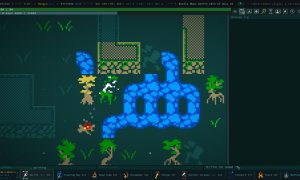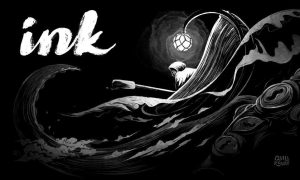It’s not a secret that I’m one of Gaming Trend’s biggest Bioware fans on staff. I’ve praised the studio for its portrayal of LGBT issues, become incredibly attached to the characters I’ve met in the Dragon Age and Mass Effect universes, and even learned a bit about myself along the way.
But I’m finding myself conflicted about Dragon Age in a way that’s honestly leaving me questioning whether or not I can continue playing the series. That’s because my often absurd level of investment in the series, and specifically my investment in my Inquisitor, August Trevelyan, isn’t exactly feeling rewarded after the end of Dragon Age: Inquisition’s final DLC “Trespasser.”
When I wrote my review for “Trespasser,” I found myself in a position where I had to put my personal feelings towards much of the Dragon Age’s narrative aside to acknowledge that what the DLC set up was a pretty great basis for the next game. But that didn’t mean that I finished “Trespasser” any less anxious about the future, and a bit disappointed in Bioware’s decision to essentially damn its protagonist, The Inquisitor, to what appears to be a tangential support role in the future.
Coming off of Inquisition’s main story, I was left with a strange feeling of emptiness after the game’s epilogue, one that felt altogether disconnected from Dragon Age: Origins and Dragon Age II as it cut out the one constant across each of Bioware’s epic fantasy RPGs, Flemeth, the Witch of the Wilds. Somehow, after three games, multiple pieces of DLC, an expansion pack, and a few side stories through novels and comics, it took me seeing Flemeth’s demise, a scene executed with little fanfare or any sort of reveal as to what the Witch had been seemingly working toward for three games, to realize that my characters and choices weren’t really leading up to anything. Unlike Mass Effect 3, there was no grand finale that Dragon Age had been building to, and I began to realize that the actions of my Warden, Hawke, and Inquisitor were simply parallel stories with occasional overlapping threads and references.
What made this revelation all the more shocking to me was the fact that Dragon Age II had hinted that my heroes’ fates could have been intertwined in some way, only for that to be retconned for the sake of simplicity. In Dragon Age II’s final moments, Leliana states that the disappearance of both previous player characters, the Warden and Hawke, is “no coincidence,” but Hawke’s appearance as a temporary companion in Inquisition, followed by a letter from the Warden that the player can receive, show that whatever it was Bioware was alluding to was either dropped somewhere in Inquisition’s development or was never actually a plot point to begin with.
The moment that essentially solidified the idea that much of Dragon Age was being written with only the vaguest of outlines was seeing Bioware state that it has no current plans for an end to the series. There isn’t a plan as to where my characters were going to end up, what effect my choices are going to have, and just what exactly it was that I am actually fighting for in these games.

So many choices, so many characters whose fates you changed. But none of them matter if we keep traveling to the opposite side of Thedas with a new protagonist.
Unlike the Mass Effect trilogy, it appears to me that Bioware is essentially making up Dragon Age as it goes along. Whether you were satisfied with the ramifications of your choices in Mass Effect 3 or not, it was clear that the big decisions were leading directly into certain conflicts, and that there would be an event you could point to and a path you could trace to understand how you got to any of its potential permutations.
I can only be so disappointed by that feeling, as sequels weren’t always part of the plan for Dragon Age to begin with, but because I felt this way, much of Inquisition’s final DLC, “Trespasser,” had me feeling pretty disappointed early on, as it appeared to be setting the series up to do what it had done before and cut almost all ties from previous games in favor of a new setting, story, and characters.
The first half of “Trespasser” is essentially Dragon Age’s equivalent to Mass Effect 3’s “Citadel,” in that it was full of silly and fanservice-filled moments that seemed like a goodbye to nearly every member of the Inquisition. I walked across the Winter Palace giving each character their moment for them and August to say goodbye to each other and the Inquisition itself. I helped the Chargers surprise Iron Bull with a dragon’s head, discussed the prospect of marrying my Tevinter paramour with Cassandra, and had a tearful farewell with Dorian, who told me he was leaving for Tevinter soon and that I couldn’t come with him.
The last of these examples I assumed was a reference to whatever was coming next for Dragon Age, as the series had conditioned me to expect my character to be absent from the next game due to frustratingly ambiguous circumstances that kept them from addressing the threat at hand.
But as I played through “Trespasser,” I began to fear that Bioware was setting up August to die instead. As you progress through the DLC, the Inquisitor’s “mark” on their left hand quickly becomes a lethal threat that would kill them off, removing the need for an excuse for why they weren’t around in the next Dragon Age. I was beside myself throughout most of “Trespasser,” because I assumed this was Bioware’s way of doing away with my Inquisitor, the Dragon Age protagonist I’d grown to love most, just for the sake of fulfilling an unnecessary requirement that each main character must be cast aside in favor of a new one in each game.
However, Bioware didn’t end up killing the Inquisitor, they merely decided to cripple him by having his arm removed. In all honesty, I found this more frustrating than simply killing him off, because there’s a certainty in death that’s not found in what has happened to the Inquisitor now.
The trouble is, “Trespasser” does so many things right that seem at odds with the idea of having a new playable character that isn’t the Herald of Andraste. Instead of making vague and cryptic references to potential conflicts like the end of Dragon Age II does, it exists as a direct lead-in to whatever it is that comes next, and makes Dragon Age: Inquisition feel like the first chapter of an incomplete story. Solas, an elf that the Inquisitor previously viewed as an ally, has revealed his true nature as an elven “god” Fen’Harel, and he aims to bring back the world of the elves that would grant them their fabled immortality, at the expense of the rest of Thedas. Just before the Inquisitor loses their arm, the player has the opportunity to claim that they will either stop Solas by force, or prove to him that his plans are not necessary.
With “Trespasser,” it feels like Bioware is finally setting up a Dragon Age game to be a continuation of what came before, not something where what we’ve done and who we were in the past is relegated to altered dialogue and references in the codex.
Despite this set up screaming “Inquisitor vs. Solas,” including moments where August claimed that “he” has a world to save, and that “we” will stop Solas, the Inquisitor still loses the arm, and presumably the ability to act as a playable character in the next Dragon Age. That Bioware chose to make the Inquisitor an amputee felt to me like something obligatory rather than something genuinely necessary, as if it was a decision made separate from the scenes that followed where he claimed that he had a world to save.
“Trespasser” exists to set up a story about a war between the Inquisitor and Solas, all while presumably taking away their ability to fight?
It’s because of this that “Trespasser” left me with a greater feeling of uncertainty than it did excitement. A story that felt like a continuation of what I’d done prior was all I wanted from Dragon Age, and now that there’s a set up that is capable of doing just that, it has me questioning just what Bioware’s intentions were with taking the Inquisitor’s arm. Is it the studio saying “this is the end for this character,” or is it layering a new personal conflict that the player will have to deal with in the next game along the lines of dealing with being a “chosen one” in Inquisition?
Never has a Dragon Age game so deliberately and explicitly set the stage for its follow-up, and never before has the fate of the protagonist we may be leaving behind been clear and not obscured by an ambiguous cliffhanger. But even with all the evidence telling me that maybe I’ll be able to continue my story as August Trevelyan, whether as the Inquisitor or just a man that was once revered as such, Bioware is saying plenty of things that contradict this set up.
In a recent interview with GameInformer, Dragon Age creative director Mike Laidlaw stated that “with Dragon Age, we’ve always been committed to providing an experience that has chapters, with new protagonists and news stories being told, because we see it as a series about a time and a place rather than an individual character.” My only thought when I read that is “why?” Especially in light of “Trespasser.”
Laidlaw has also stated in an interview with GameSpot that “with Trespasser, at least we have closure,” to which I can only ask “where?”
Both of these interviews were published prior to “Trespasser’s” launch, so the optimist in me says that Laidlaw may have just been avoiding spoiling the final act, but I still find it worrying that my Inquisitor’s story is not done but he may not be the one I get to experience the next chapter through.
As Dragon Age currently stands, there’s a great deal of unresolved plot threads that will likely stay unresolved the further we move away from them, choices that are played up as major in-game but end up going nowhere or are retconned, and characters that are discarded just as quickly as they were brought into the spotlight.
If the next Dragon Age follows the Inquisition (or what’s left of it) into Tevinter as it not-so-subtly implies it will, this could be the beginning of a more focused and interwoven narrative for the series that it has lacked, but only if the studio commits to it. I genuinely feel that allowing players to experience it through the eyes of a character they’ve already grown to care about and shape is necessary to prevent it from feeling fractured, jarring, and impersonal.
Hawke appeared as a temporary companion in Inquisition, and while I found his role to be fitting for my version of the Champion of Kirkwall, I know there were many that found them to be out of character. The Inquisitor could very well take on an advisor role in the next game, but that does risk a similar issue. Which is why I don’t understand why the decision was made to disable a character that is intrinsically tied to this new conflict and could essentially act as Dragon Age’s own Commander Shepard.
This is all speculation on my part, but it’s backed by Bioware’s own claims that Dragon Age isn’t, or apparently can’t be about one person. But just because that’s what Dragon Age has been doesn’t mean that’s what it has to be. There’s a personal story to be told here, one of a character that fans already have an investment in, but if it’s going to be undermined by some arbitrary rule that we can’t keep a protagonist for more than one game, then what’s the point in getting invested in the first place?
As much as it pains me to imagine playing a Mass Effect game that isn’t about Shepard, I can understand why Mass Effect: Andromeda isn’t about the first human Spectre because their story is done, but unless Bioware does what it’s done in the past and sweeps it under the rug, the Inquisitor’s story is far from over. Thedas isn’t Mass Effect’s world, but it’s not without options as to how the Inquisitor could be just as capable as they’ve ever been. So, perhaps I shouldn’t view their fate as some sort of contrived means of benching them during a war that would likely have them at the center. But every time I start to feel optimistic that I might get to be the Inquisitor again, I remember that everything about Dragon Age before now has trained me to expect that my character and their influence will be essentially forgotten by the time I can go back to Thedas. But if Dragon Age 4 comes around and the Inquisitor isn’t given the opportunity to finish their own fight because there’s a perception that that is “how it has to be,” I may have to close the book on my own Dragon Age story, as it’s not one that Bioware seems intent on telling.

See below for our list of partners and affiliates:
